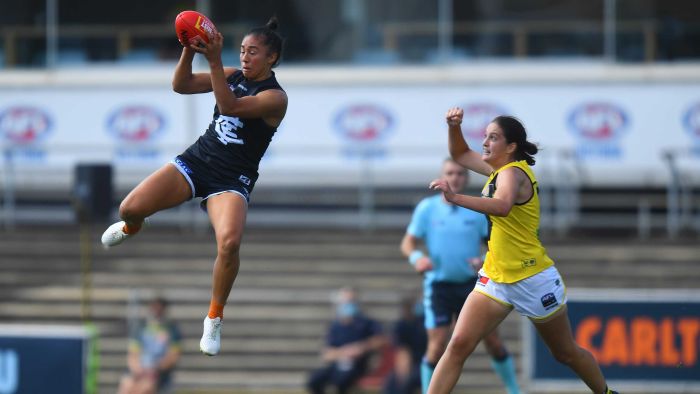At the mid-way point of the fifth season of AFLW, contenders for the best game in the competition’s history keep accumulating.
Judging by social media, the standard of each round appears to eclipse the last.
Loading
In round three there was near-universal agreement that the best game of AFLW was the crowd-less epic between Melbourne and the Kangaroos at Casey Fields.
In round four, the winless Tigers had fans on the edge of their seats as they pushed the Blues to the death at Princes Park.
Just a day later, that contest was rivalled by the Lions and Crows, with an Erin Phillips masterclass (four goals and 21 disposals) the only difference in a game played at finals-like intensity.
Loading
Such top quality football follows the highest-scoring opening round since the competition began, which was endorsed by a 15 per cent increase in TV viewership on the previous season, and a number of sold-out games.
Year on year, the difference in the standard of the competition is palpable, a fact that can be attributed in part to the emergence of a group of young players who are matching it with their much more experienced peers in the space of just a few games.
Loading
As just one example, Tyanna Smith finished her fourth game for St Kilda with 16 disposals, including eight contested possessions, eight score involvements and 13 tackles.
But it wasn’t just the stat sheet that impressed: her one-handed pick-up and hit-up of teammate Jacqui Vogt on the lead had Kelli Underwood calling her “the future of the St Kilda football club”.
“What about the pick up?” cried Underwood, before adding: “In fact, forget the future, that is the now.”
Loading
Smith was by no means the only youngster to impress. After her goal-of-the-year contender in round three, another rising star in Jess Fitzgerald was also critical in getting her Bulldogs over the line against the more-fancied Dees with two goals and 12 disposals, including seven tackles.
It’s a trend not lost on Pies captain Bri Davey, who puts the improvement down to the opportunities girls now have to play football “uninterrupted” from juniors all the way through to AFLW.
“The youngsters coming through, with uninterrupted pathways, they just have those footy smarts that mean they can come in straight away and have such an understanding of the game,” Davey said after her own 31-disposal performance at Docklands.
“And usually their skills are pretty up to scratch too, which is a plus.”
By contrast, many of the so-called ‘veterans’ of AFLW — such as dual best and fairest and 35-year-old Phillips — were forced to give up the game they loved in their teens, when their pathway to senior football ended at 13.
It’s a scary thought given Phillips was sidelined from Australian Rules for a full 18 years before returning to co-captain the Crows in 2017.
It begs the question many have been asking since the competition’s inception: just how good can the next generation be, and just how much better could Erin Phillips have been?
Loading
Are boys ‘disadvantaged’ by the growth of women’s football?
In the background, the AFL has been busy making a number of changes to its underage competitions to facilitate the growth of future stars of the women’s game.
In Victoria, this includes providing girls with greater access to full-time staff who work across both girls’ and boys’ programs.
Loading
But according to one Fox Footy article this week, not all clubs or players are happy with the changes.
This includes one AFL list manager, who is quoted, without being named, as saying that the AFL has “ripped the heart out of the pathway system”.
The article alleges that nine clubs are unhappy about the changes, stating that “most felt boys programs have been disproportionately disadvantaged by the growth of female competition”.
It’s a bizarre sentiment given girls and women have been marginalised and excluded from the game for centuries.
In that regard, it was arguably the AFLW players who said it best on “Part Timers” — a media platform created and owned by the players.
Loading
“Quite shockingly it turns out that steps towards equality require the privileged to make changes,” the players wrote sarcastically in a tweet.
For stalwarts of the women’s game, the fight for greater equality in Australia’s favourite game has been long and arduous.
This includes the likes of Barb Hampson and Lisa Hardeman, after whom the annual clash between Melbourne and the Western Bulldogs is named, and whose Cup the Bulldogs this year regained.
While there’s undoubtedly a long way to go, those of us around to witness the highs of season 2021 are now catching just a glimpse of the true potential of women’s football.
After the quality of what’s being served, you’d be hard pressed to argue that the game isn’t better for it.
Loading







